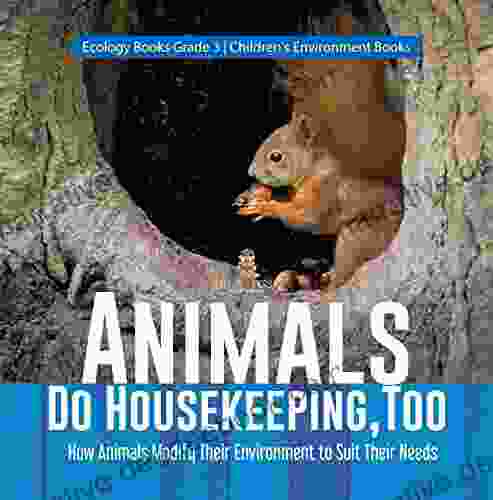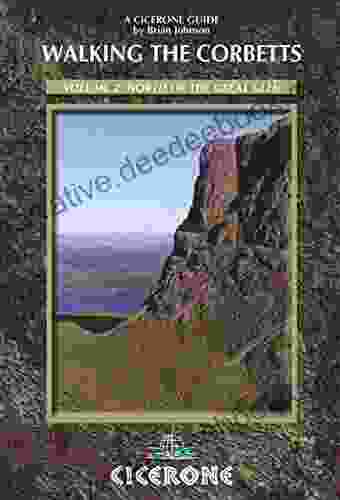Animals Do Housekeeping Too: How Animals Modify Their Environment to Suit Their Needs

Humans aren't the only ones who enjoy a clean and organized living space. Many animals exhibit remarkable housekeeping behaviors, modifying their environment to suit their specific needs and preferences. From constructing elaborate nests to maintaining hygienic sleeping areas, animals demonstrate a diverse range of housekeeping skills. In this article, we will delve into the fascinating world of animal housekeeping, exploring how various species utilize their surroundings to create optimal living conditions.
Birds: Master Nest Builders
The construction of nests is one of the most striking examples of animal housekeeping. Birds, in particular, exhibit exceptional nest-building abilities, employing various materials and techniques to create intricate structures that provide shelter, warmth, and protection for their young.
4.9 out of 5
| Language | : | English |
| File size | : | 37464 KB |
| Screen Reader | : | Supported |
| Print length | : | 72 pages |
One of the most well-known bird architects is the weaver bird. These African birds construct elaborate nests using woven grasses and plant fibers. The nests are often suspended from tree branches and can range in size from small, cup-shaped structures to large, communal colonies. The weaver bird's intricate weaving skills allow them to create nests that are both sturdy and breathable.
Another impressive nest builder is the tailorbird. These small Southeast Asian birds use their sharp beaks to sew leaves together, creating a secure and concealed nest for their eggs. The tailorbird's ability to manipulate vegetation demonstrates the remarkable adaptability and ingenuity of animals in modifying their environment.
Mammals: Clean and Cozy Dens
Mammals also engage in housekeeping behaviors, particularly when it comes to maintaining the cleanliness of their dens. Many mammals, such as foxes, wolves, and bears, line their dens with soft materials such as moss, grass, and fur. This provides insulation and comfort, while also helping to absorb moisture and odors.
Beavers are known for their impressive dam-building abilities, which create ponds that serve as their homes. By felling trees and manipulating water flow, beavers modify their environment to create a safe and suitable habitat for themselves and their young.
Insects: Social Sanitation
Insects, often known for their industrious nature, also exhibit remarkable housekeeping behaviors. Social insects, such as ants and termites, maintain a high level of hygiene within their colonies. They regularly clean their nests, removing waste and dead individuals to prevent the spread of disease and parasites.
Ants are particularly meticulous in their housekeeping efforts. They not only remove waste from the colony but also engage in what is known as "grooming," where they clean each other's bodies to remove dirt and parasites. This cooperative behavior helps to maintain the health and efficiency of the colony.
Hygiene in Aquatic Animals
Even aquatic animals engage in housekeeping behaviors to maintain a clean and healthy environment. Some fish species, such as the cleaner wrasse, have evolved specialized roles as "cleaners" that remove parasites and dead skin from other fish. This symbiotic relationship benefits both the cleaner wrasse and the fish it cleans by reducing the risk of disease and infection.
Environmental Implications
Animal housekeeping behaviors have significant implications for the environment. By modifying their surroundings, animals can influence the structure and dynamics of ecosystems. For example, the nest-building activities of birds can create microhabitats that support a variety of other species. Beavers' dam-building can alter water flow patterns, creating wetlands that benefit a wide range of aquatic life.
The housekeeping behaviors of animals are a fascinating and often overlooked aspect of animal behavior. From the intricate nests of birds to the meticulously clean dens of mammals, animals exhibit a diverse range of skills and strategies to modify their environment to suit their needs. These behaviors not only enhance the animals' survival and reproductive success but also have broader implications for the health and balance of ecosystems. By understanding and appreciating the remarkable housekeeping abilities of animals, we gain a deeper appreciation for the complexity and adaptability of life on Earth.
4.9 out of 5
| Language | : | English |
| File size | : | 37464 KB |
| Screen Reader | : | Supported |
| Print length | : | 72 pages |
Do you want to contribute by writing guest posts on this blog?
Please contact us and send us a resume of previous articles that you have written.
 Book
Book Page
Page Chapter
Chapter Text
Text Genre
Genre Reader
Reader Paperback
Paperback Magazine
Magazine Sentence
Sentence Bookmark
Bookmark Shelf
Shelf Bibliography
Bibliography Foreword
Foreword Preface
Preface Synopsis
Synopsis Scroll
Scroll Codex
Codex Library card
Library card Biography
Biography Memoir
Memoir Encyclopedia
Encyclopedia Thesaurus
Thesaurus Narrator
Narrator Character
Character Librarian
Librarian Catalog
Catalog Archives
Archives Periodicals
Periodicals Study
Study Research
Research Scholarly
Scholarly Reading Room
Reading Room Rare Books
Rare Books Interlibrary
Interlibrary Study Group
Study Group Thesis
Thesis Dissertation
Dissertation Storytelling
Storytelling Reading List
Reading List Theory
Theory Lief H Carter
Lief H Carter Alexander Mccall Smith
Alexander Mccall Smith Filippo De Florio
Filippo De Florio Mick O Shea
Mick O Shea E T A Hoffmann
E T A Hoffmann Christian Bermes
Christian Bermes Terry Gamble
Terry Gamble Yung Hsiang Lu
Yung Hsiang Lu Rose Elaine Lumley Brantley
Rose Elaine Lumley Brantley Belinda Kroll
Belinda Kroll Alberto Alemanno
Alberto Alemanno Marc Stanford
Marc Stanford David Michie
David Michie L J Shen
L J Shen Jack Montgomery
Jack Montgomery Justin Sandercoe
Justin Sandercoe Alicja Urbanowicz
Alicja Urbanowicz Ellen Alpsten
Ellen Alpsten Maurice Peress
Maurice Peress Katie Startzman
Katie Startzman
Light bulbAdvertise smarter! Our strategic ad space ensures maximum exposure. Reserve your spot today!

 Jace MitchellUnveiling the Thrilling World of Monster Trucks: An Interview with Samantha...
Jace MitchellUnveiling the Thrilling World of Monster Trucks: An Interview with Samantha... Deion SimmonsFollow ·14k
Deion SimmonsFollow ·14k Alexandre DumasFollow ·16k
Alexandre DumasFollow ·16k Stephen FosterFollow ·18.3k
Stephen FosterFollow ·18.3k Oliver FosterFollow ·14.5k
Oliver FosterFollow ·14.5k Xavier BellFollow ·16.5k
Xavier BellFollow ·16.5k E.M. ForsterFollow ·13.6k
E.M. ForsterFollow ·13.6k Stuart BlairFollow ·13.1k
Stuart BlairFollow ·13.1k Quincy WardFollow ·16k
Quincy WardFollow ·16k

 Dallas Turner
Dallas TurnerParasols and Peril: Adventures in Grace
In the quaint town...

 Caleb Carter
Caleb CarterFlight Attendant Joe: A Dedicated Professional in the...
Flight Attendant Joe...

 Jerry Ward
Jerry WardPick Lottery The List For 23 States August 15 2024
The Pick Lottery is a multi-state lottery...

 Hudson Hayes
Hudson HayesHow the Media Wields Dangerous Words to Divide a Nation
In a world where the media is...

 Curtis Stewart
Curtis StewartThe Magic Mala: A Story That Changes Lives
In the realm of ancient traditions and...

 Raymond Parker
Raymond ParkerEarthly Meditations: A Poetic Tapestry of Nature,...
In the realm of contemporary...
4.9 out of 5
| Language | : | English |
| File size | : | 37464 KB |
| Screen Reader | : | Supported |
| Print length | : | 72 pages |










